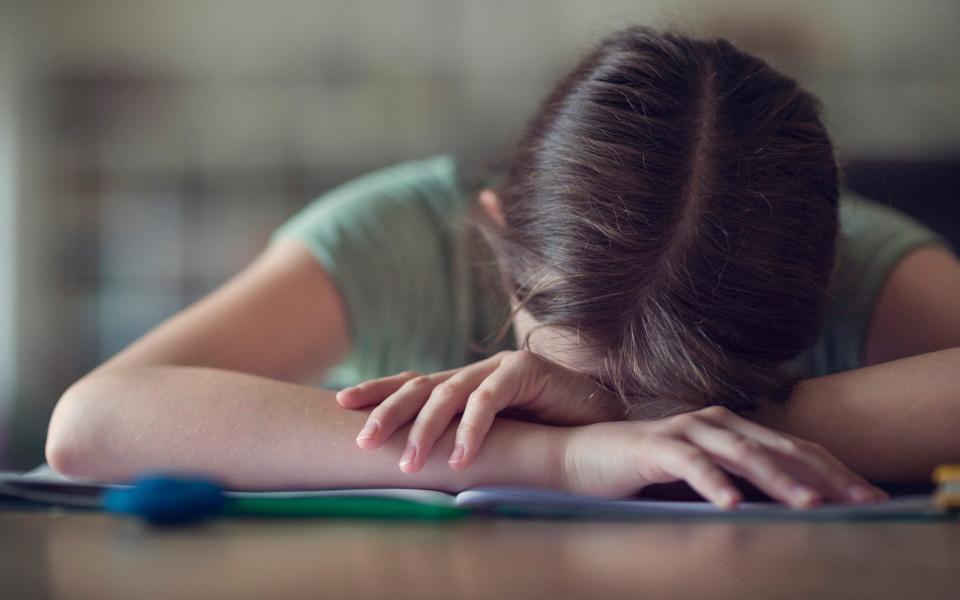Twice as many girls as boys are worried about their own mental health

Twice as many girls as boys are unhappy with their mental health, a landmark survey has found.
More than half a million children aged between four and 17 responded to the Big Ask survey, run by the Children’s Commissioner, which looked at how children were coping and how they saw their futures.
It found that across age groups, girls were twice as likely as boys to say they were unhappy with their mental health following school closures during the pandemic, exam stress and negative experiences of social media.
The effects were felt more acutely by older children, with 40 per cent of 16- to 17-year-old girls saying they had poor mental health – while only 22 per cent of boys said the same.
Many of those children who report feeling unhappy say they do not know how to deal with the problem.
'I don't know how to get help'
One 14-year-old girl said: “It is such a taboo subject, I […] don’t know how to get help, simply because it’s so hard to bring up. I’ve spoken to other people in person and online about this, and a lot of them feel the same way.”
Responding to the survey, children raised concerns about their future, and whether they would have a life better than their parents.
One 16-year old girl said: “We are told that our generation are lazy and snowflakes, that we have never suffered like generations before us.”
One in 11 children said that they did not think they would have a better life than their parents, with concern for the environment “an overwhelming priority”, according to the report.
Thirty-nine per cent of those aged nine to 17 said the environment was one of their main worries about the future. It was the second most common answer, after having a good job or career.
The report notes that many shared the sentiment of this 12-year-old, who said: "If we don’t fix climate change, we won’t have a future."
Today's 'heroic' children are 'veterans of a global crisis'
Dame Rachel de Souza, Children’s Commissioner for England, said: “Given what they have sacrificed during the Covid pandemic, not only did they deserve a Big Answer from me, which I think we have given, but they have inspired me with how resilient, consistent, optimistic and thoughtful they are, even those most vulnerable and from deprived backgrounds.
“I hope the Big Answer will be the foundation for a truly transformative period for a generation who are far from ‘lost’ and need all of us to help build them the future they most certainly deserve."
She added: "This is not a 'snowflake generation.' It is a heroic generation. A generation of children who are veterans of a global crisis. They have seen how colossally frightening life can be, far too young, and have made a lot of sacrifices.
"But they have endured, and are emerging stronger and prematurely wise. Bruised, yes, and in many cases seriously vulnerable, but, for the most part, happy, optimistic and determined.
"They are a survivor generation - a sleeves-up, pragmatic generation, with civic-minded aspirations."
Children in the survey placed a high value on their education, with 69 per cent of nine- to 17-year-olds saying having a good job was one of their main priorities.
The fact that their learning was so disrupted during the pandemic was a major source of their unhappiness.
The report said: "Children thought hard about education during lockdown. They missed their friends, they missed their teachers, they missed activities, and they missed real classroom learning."
'Children's voices must be heard – and I am listening'
Just over half of nine- to 17-year-olds said that they were currently happy with their school or college life, while those in deprived areas and at schools rated as poor by Ofsted were more likely to be unhappy at school.
Nadhim Zahawi, the Education Secretary, said: “This huge survey of half a million children and young people gives us some fantastic insight into what makes them tick. Too often children’s voices are missing from national debates about their wellbeing, but they must be heard - and I am listening.
“I’m encouraged to see most children and young people are happy, resilient and ambitious, but there are concerns too and we must address them.
“We know that the pandemic hit young people hard, which is why we have launched a tutoring revolution to make sure they catch up and bolstered mental health support in schools. As we drive to level up opportunities across the country, we will continue prioritising young people’s wellbeing alongside academic success.”

